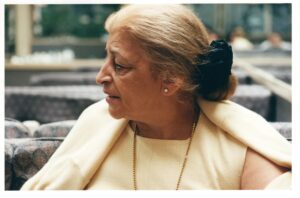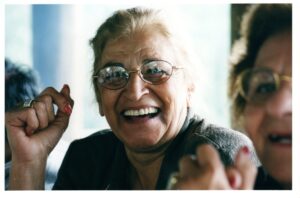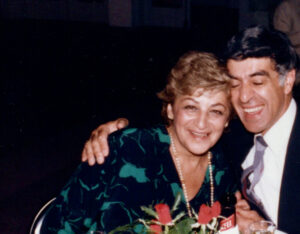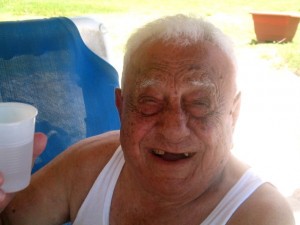Posts Tagged ‘remembering’
You Are My Sunshine: Remembering
We shared a birthday.
Auntie Laila and me.
And every year, when March 29th rolled around, I would call her, or she would call me.
This year marks the final such exchange.
Auntie Laila died yesterday.

Just as her personality was larger than life, the impact she had on me is much larger than the quantifiable amount of time that we spent in each other’s company.
We’re also part of an extended family in a culture where the furthest relation is as close as your brother or your sister, your mother or your father.
Auntie Laila was married to my Uncle Ed who is in fact my paternal grandfather’s first cousin.
That gives you a sense of how distant we are from one another on the family tree.
However, when it comes to human connection, closeness defies measurement. You cannot measure love in metres, centimetres, and kilometres or miles, inches, and yards.
When it comes to family, to those we love, distance is only every measured in heartbeats, thoughts, and dreams. If you think of a person, then they are with you. If you dream of a person, then they are with you. And when such a person dies, they never leave you.
The strength of the tie between Aunt Laila, her daughter Medina, my mother, and my sisters can be traced to a particular time and place.
We were living in Beirut in the early 1970s when Aunt Laila and Medina came to visit. In my memories, my father wasn’t there. He worked in Kuwait and was typically home for only one week every month or so.
This must have been one of the times he was away. The task of entertaining and touring fell to my Mom who at the time drove a red, four-door Peugeot. We crammed into the car, all six of us, for whichever excursion Mom and Auntie Laila had dreamt up. We would pass the time in conversation, laughter, and with music. In particular, a song.
“You are my sunshine, my only sunshine …”
Whether careening around the streets of Beirut or driving up to Karoun, the family village in the Bekaa Valley, we’d sing loudly and exuberantly with Auntie Laila leading the choir as the minutes ticked by on the clock and the kilometres of asphalt flowed under the tires.
“You make me happy when skies are gray …”
From that point on, Auntie Laila and my mother were sisters and whenever they were together they would gossip, they would giggle, they would laugh out loud. They supported one another, they travelled together, and they cooked for everyone.

When Mom died in 2015, Auntie Laila was unable to travel to Vancouver for the celebration of life, but she was in that room with us all.
She was there.
Knowing that Auntie Laila’s illness was advancing, and with the loss of another family matriarch that year, I was overwhelmed with the need to see her.
To hug her. To hear her say “Ya aini, ya habibti…”. My eyes, a profound endearment in Arabic, my dear one.
So, Luc and I did just that. We went to see Auntie Laila.
We embarked on a three-week road trip that took us from Vancouver to Kamloops, Jasper, Grande Prairie, Edmonton, Calgary, Lake Louise, Kelowna, and back home. At many stops along the way, we spent time with friends and family members. And in Grande Prairie, we caught up with Auntie Laila and the many relatives there.
It was magical.
“You’ll never know dear, how much I love you
Please don’t take my sunshine away …”
The last time I saw Auntie Laila in person was early December 2019.
I had suggested to my father that we visit Grande Prairie because the one truth that we continue to forget and have to relearn is that life — no matter how much we try to wrestle it to the ground — is random and change can come suddenly even when it seems like we will have forever. The toll of age and illness is never predictable. The time to go and see, to stop and call, to visit and reminisce is always now although it is not often feasible to follow through on such intentions and desires.
We were lucky enough to make plans and to act on them.
Dad and I travelled to Grande Prairie. As he challenged Uncle Ed to consecutive games of crib, I sat on the couch in the family room or in the living room and Auntie Laila sat in her chair. We would chat or not, we watched the Christmas movies playing on the television, or not. It didn’t really matter. What mattered is I could look up and see that she was there. I could smile at her, I could hug her, I could say, “I love you.”
The last time I saw Auntie Laila was just a few weeks ago on March 14th during a Zoom call that gathered households together from around the world to celebrate a number of family milestones.
Auntie Laila didn’t say anything, and she may not have quite understood what all the fuss was about, but just to see her made me tear up because while it felt as if she were in the room with me, she was so very far away.
“The other night dear, as I lay sleeping
I dreamt I held you in my arms …”
And now the connection has been disrupted.
There is comfort in the idea of Auntie Laila at peace, or more accurately — as my cousin Medina said to me on the phone today — she is somewhere cooking, shopping, laughing, gossiping, and partying up a storm with Alma, Haifa, Maza, and Yulanda among so many others.
It is, however, a cold comfort because the void she leaves behind is immense. It is now a distance that we will all only be able to traverse in our dreams, in our memories, and in our hearts.

In the stories we share with one another, over the years to come, of a woman who meant so very much to each and every one of us.
“But when I awoke, dear, I was mistaken
So I hung my head and I cried.”
Remembering
My maternal grandfather, Mr. Mike as he was known, passed away in 2008 at the age of 104. Yesterday, October 9th, would have been his birthday. These are the words I spoke at his funeral four years ago.
“As you can see, I’ve written a book. But, before I start, let me say one thing. Looking around at this incredible gathering, the one person I know who’s having the time of his life, wherever he may be, is Michael Khaleel George Azan.
My name is Reema and I’m Mr. Mike’s granddaughter. My mother is Y., Miss U as she’s known in Spaldings.
I hope, as C. and I speak, you’ll hear the echo of the many voices speaking with us today, the voices of all Mr. Mike’s grandchildren and great-grandchildren.
When I asked my 7-year old son what he remembers most about Grandpa Mike, he answered: “He was very old and he sat a lot.”
I know how lucky my son is to have known his great-grandfather well enough to have memories of him.
But I’m sad he didn’t know Mr. Mike the way my cousins and I did.
Mr. Mike, until recently, was not a guy who sat a lot: he loved to move, he was loud, he was vivacious, passionate, strong, loud, he loved to travel, he was loving, full of energy, brimming with confidence, and … loud.
Grandpa Mike was a force of nature and it seems only fitting that we remember him today, September 10th, which I’ve read is the peak day of hurricane season.
He was a man of the earth. Born in Lebanon and living in poverty, he once told me he “walked four year barefooted.” His footprints are embedded in the very soil of our world: in Europe as he made his way to his new island home in 1922, in Jamaica – his home for 86 years, or in Canada and the United States where he visited family.
He was a man who enjoyed the bounty of the earth. If there ever was a man who gloried in the pleasure of food – and was deeply thankful for every mouthful – it was Mr. Mike.
In the morning, he would have a glass of water, a cup of hot strong coffee and two bananas. And that was before breakfast. My cousin D. remembers him in the kitchen, in his white undershirt, mixing Fatoosh, a Lebanese salad, in a huge aluminum bowl to feed members of the family who would gather around the tables set end to end to accommodate everyone.
On Friday nights, Uncle V.’s family would travel up to Spaldings for dinner. V.’s son remembers how Grandpa Mike made him feel special by making sure that even as a child he was included in the conversation.
It was that ability to make people feel special that made Grandpa Mike such an expert salesman, or as my cousin G. says, “he could sell water to a fish in a pond”.
No one who knew Mr. Mike could deny that he had fire in him. You know that if there was music, it wouldn’t be long before he’d get up to dance.
At his 100th birthday celebration, my sister remembers how his eyes twinkled as he watched a belly dancer perform. When he tried to join her, his children urged him to remain seated. He shrugged them off, got up to dance, twirling his white handkerchief around and around.
Mr. Mike loved his family fiercely, and he had a temper, one that chased many a customer out of his store.
I remember visiting Jamaica as a young girl of 11 and being utterly fascinated by the store. I remember it as a dim cavern of treasures: men’s fabrics, women’s fabrics, cotton panties, housewares, lace, thread, mixing bowls, brooms, ribbon, and buttons.
My favourite part of the store was the mezzanine where there were boxes and boxes of shoes, some easily twenty years old.
I remember the magic of the place: it was a dragon’s den and Mr. Mike was the fire-breathing guardian. He used his voice to bellow his disapproval, and my cousin D. remembers that he also used brooms, pots and pans, and even shoes which he threw down the street after the people running away.
Mr. Mike was so physically strong. My cousin L. remembers his “hugs were so tight you thought he broke a rib and the kisses that were so hard, I swore his beard cut my face open.”
He was also a man of beliefs. The essence of his philosophy, as described by my cousin S., was his love of God, his love of family, and his love of friends.
I believe that part of Mr. Mike’s longevity was his innate curiosity about the world and an appreciation for all the things in it. This is a man who had no formal learning, but he was always asking questions.
And he never seemed to forget a thing. I once asked him to tell me about Spaldings when he first arrived. According to the notes I made, here’s some of what he told me: “Eggs was 6 pence a dozen, meat was 6 pence a pound. A big loaf of bread was 9 pence. 9 pence was money.”
Earth. Fire. Air. These, according to ancient philosophers, are considered the principal elements of nature along with water. I like to think of life as a river. You’ve got to jump in and go with the flow.
Most of us are tempted to reach out and grab a branch or a log to get to safety. Not Mr. Mike.
I believe he was fully immersed in the river of life and trusted the current to carry him.
The word hero is thrown around a lot in our world. But sometimes I think the most extraordinary people amongst us, the true heroes, are those like Mr. Mike, who live in contentment, who take joy in their family and friends, and who work on behalf of their community. Who ride the ups and downs of life, who take the good with the bad, and who smile every day.
Mr. Mike used his voice to share his stories with all of us. Sadly, we’ve lost that voice. He didn’t have the ability to capture those stories with words on a page, but he had pictures. He was obsessive about pictures. I think that’s because they were his diary, his journal, his testament. He could look at them and say: “I’m a good man. I’ve lived a good life. These are the ones I love and this is my life’s work.”
We are his life’s work: his children, his grandchildren, his great-grandchildren. And to him we were – we are – masterpieces. Flaws and all. And, if we’re smart enough, and if we love enough, as we go about our daily lives, we will hear the echo of his footsteps, the echo of his voice, and we will feel the echo of his arms around us, and the echo of his heartbeat, here, inside each and every one of us.”
